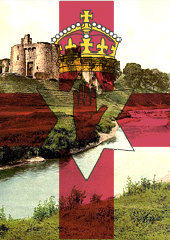From Bombs to Boom: Belfast Reborn
How has political reconciliation paved the way for Northern Ireland’s economic rejuvenation?
December 5, 2007

Picture the scene: religious strife, terrorist bombings, punishment killings, hostage taking, urban warfare.
If you think this is a report from Baghdad, you are way off the mark.
Far from expectation
It actually describes the situation in Belfast and Northern Ireland as a whole throughout the 1970s, 1980s and early 1990s.
Now picture a very different scene: construction cranes, new hotels, new jobs, new businesses arriving, home-grown businesses expanding overseas, tourists flocking.
No, this is not (just) a description of the city of Dublin (though it could be) — but also of Belfast, the former home of “the troubles.”
Changing times
Northern Ireland has been transformed from an economic black spot to become the fastest-growing region of the whole United Kingdom — its prosperity equalled only by its neighbor to the south, the Republic of Ireland.
In the past decade, unemployment has been cut in half to 4%, while manufacturing output has risen by 24.5%.
Attracting big business
With its population of just 1.7 million people, Northern Ireland has managed to attract 700 international businesses — including Caterpillar, Microsoft, Coca Cola and Oracle.
Meanwhile, Northern Irish businesses have started to cast their nets to the wider world.
Take Andor Technologies, which hails from West Belfast, the neighborhood that saw the fiercest fighting during the 30 years of sectarian warfare.
Transatlantic connections
Andor has developed a thriving business in manufacturing high-performance digital cameras. With a staff of 170, it has just opened up a sales office in Connecticut.
Another striking example is Almac Sciences, which develops cancer technology treatments — and employs 2,000 people in Europe and the United States.
Tracking history
Almac is based on the Garvaghy Road in county Armagh — a place that gained international notoriety as the site of violent scuffles and tense standoffs between Catholics and Protestants during the annual Unionist marching season.
So how did this remarkable renaissance come about?
According to Tim Losty, Director of the Northern Ireland Bureau in Washington, D.C., its origins can be traced back to well before the peace process.
Change in youth attitudes
“For 30 years, we had very few industries. But we did have a big investment in education — because young people basically were looking for a way to get out. But once the ceasefire happened in 1994, they stayed on.”
While some multinationals like Seagate and DuPont came to Northern Ireland before the ceasefire, “we weren’t getting the critical mass we have now in sectors like IT, biotechnology, nanotechnology and financial services,” Losty says.
Increasing immigration
Immigrants are pouring into the province for the first time too, especially from Poland, Portugal, Latvia and the Philippines. They fill vacancies in the healthcare, hotel, restaurant, agriculture and food-processing sectors.
A thousand Poles recently applied for the Northern Ireland Police Service. The Ulster Unionist Party has even translated its website into Polish and Portuguese (and in Punjabi, Urdu, Bengali, Arabic and Chinese too, as a quick check reveals).
Evidently, the economic boom in southern Ireland that began in the early 1990s had a spill-over effect.
Taking from the neighbors
As the business community started to hear the roar of the phenomenon down south on the island known initially locally — and now globally — as “The Celtic Tiger,” they began to lobby the politicians to change their sectarian ways.
Some progress has been made. The Good Friday agreement was signed in 1998, leading to the return of devolved government (the province had been ruled directly from Westminster since 1972).
Improving its image
However, direct rule was restored once again in 2002, as the main political parties could not agree on a power-sharing executive.
A historic power-sharing agreement was reached in late March 2007 between the Democratic Unionists and Sinn Fein that led to devolved government being restored on May 8.
The province has remained at peace, in stark contrast to the violence seen in Israel/Palestine, a region whose peace process mirrored that of Northern Ireland in the 1990s — until the Intifada broke out in 2000.
Moving along
Meanwhile, the economic revival has been racing along at breakneck speed, especially in Belfast.
The old Harland and Wolff shipyard where the Titanic was built is no longer churning out ships. Instead, a $1.75 billion development plan is underway that will see new businesses, residences and a science park spring up.
Confident attitudes
The whole spirit of the city has been transformed, says Geraldine Hughes, who was born and bred in West Belfast and is currently starring in the new Hollywood blockbuster “Rocky Balboa” as the love interest of Sylvester Stallone.
“Confidence — that’s the first thing I notice each time I go home. I see it in how people sell themselves, in how they dress. They even walk differently,” Hughes told The Globalist.
So can the political leaders claim credit for this transformation — or is it the product of pure entrepreneurial spirit?
Working together
“It’s a combination of both,” Hughes says diplomatically. “There was always a lot of potential in Northern Ireland. The smart ones got in early — but I wouldn’t negate what the people in power have done.”
And the economic development managers also believe that the economy would never have taken off as much as it has were it not for the peace process.
Northern Ireland is not quite a socio-economic nirvana yet, however.
This is evidenced by Northern Ireland’s need for some of the world’s most sophisticated anti-discrimination laws in the workplace. But, “that by itself has not changed hearts and minds, especially in disadvantaged areas,” says Losty. The difference, though is crucial. While sectarianism had been institutionalized 30 years ago, now businesspeople can think about business first.
All of which goes to show that, while peace processes are important as a confidence-building tool, religious strife lingers and feeds on itself where there is no economic opportunity.
Helping Baghdad
The story is as true for the Belfast of yesteryear as it is for the Baghdad of today.
How poignantly fitting then that Northern Ireland officials and NGOs are now advising delegations from the likes of Iraq, Cyprus, Palestine and Sri Lanka on how to resolve sectarian conflicts
After years of relying on international help — notably the United States and Europe — to get back on its feet, Northern Ireland is finally in the position of being able to give something back.
Takeaways
Northern Ireland has transformed from an economic black spot to the fastest-growing region of the whole UK.
Can the political leaders in Northern Ireland claim credit for this transformation — or is it pure entrepreneurial spirit?
After years of relying on international help, Northern Ireland is finally in the position of being able to give something back.
Read previous

Assessing Putin
December 4, 2007
